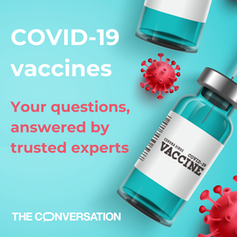'Never' or just 'not yet?' How timing affects COVID-19 vaccine hesitancy

As COVID-19 case counts continue to rise across Canada, it is clear that we’re far from “out of the woods” with this pandemic. While much is still unknown about the Omicron variant, it seems very likely that existing vaccines will offer protection against severe cases of COVID-19, and Canada is rapidly administering booster shots in an effort to help to bolster immunity.

While vaccination coverage against COVID-19 is relatively high (76.49 per cent of the total population is fully vaccinated at the time of writing), there remains a substantial group of Canadians who are either unvaccinated, or only partially vaccinated against COVID-19.
At this point in the pandemic (more than six months after most Canadian adults became eligible to receive a COVID-19 vaccine), should we declare this level of vaccination coverage as the “vaccine ceiling?” Our research suggests the answer is no.
Vaccine hesitancy in a COVID-19 world
As defined by the World Health Organization’s Strategic Advisory Group of Experts (SAGE), the term “vaccine hesitancy” is used to describe “a delay or refusal of vaccination, despite availability of vaccination services.” The range of reasons why some Canadians remain unvaccinated is wide, including (but not limited to) concerns about “personal freedom,” health concerns and the belief that COVID-19 is not as serious a health threat as it’s made out to be.

Much of the existing research on vaccine hesitancy has focused on identifying personal or demographic factors associated with vaccine hesitancy, such as age, gender and socio-economic status. Our research investigated the role of timing in vaccine uptake.
Given the unique nature of the COVID-19 pandemic and its vaccines, not all Canadians gained access to a vaccine at the same time — and many around the world are still waiting for access. As a result, people had to start thinking about their vaccine decisions in hypothetical or future contexts. Because of this, we sought to understand how thinking about COVID-19 vaccine availability along different timelines might influence a person’s vaccine decisions.
Survey results
In December 2020 (just prior to broad vaccine availability in Canada), we asked Canadian survey respondents about their impending vaccine decisions. Each participant was presented with one variation of the question:
“If a coronavirus vaccine was available to you (today, or in one month, or in six months, or in one year), would you get vaccinated, or not?”
In analyzing results from this experiment, we found that the proportion of most enthusiastic participants (those who selected “Yes, as soon as possible” as a response) increased substantially as the proposed date of vaccine availability became more distant.
Even more interesting was our finding that the proportion of hesitant people decreased as the proposed date of vaccination moved further into the future. The proportion who responded that they would “Wait some time” before vaccination, and the proportion who responded, “No, I would not get a coronavirus vaccine,” both decreased as vaccine availability became more distant in time.

This has important implications for Canadian policy-makers. While the swift uptake of a COVID-19 vaccine might be the ideal scenario for squashing case counts, these findings suggest that those who are hesitant aren’t necessarily going to refuse the vaccine altogether.
This finding may also be useful for countries that are much further behind on mass vaccination efforts, as it suggests a delayed vaccine rollout might encounter less hesitancy and have faster uptake.
What are they waiting for?
We also asked open-ended questions about what Canadians would wait for, before getting the vaccine. What we found is that many Canadians who said they were waiting for “some time to pass” were couching their true concerns (for example, waiting for a certain number of other people to be successfully vaccinated first) within the more broad category of “timing.”
It may be useful to remember this finding when having conversations with folks who might be vaccine hesitant. Offering space for people to elaborate on their vaccine concerns might help bypass default responses and reveal alternative reasoning that has the potential to be addressed.
In some cases, these concerns might even be addressed with empathetic listening, by input from trusted experts or from evidence that speaks to the values and beliefs of those who have questions.
Read more: COVID-19 vaccine hesitancy can be overcome through relatable stories and accessible information
As recent Omicron surges remind us, vaccination alone is not a silver bullet in the fight against COVID-19. However, it remains an important tool in mitigating the spread and severity of the disease, and the United Nations Foundation still positions vaccine equity as our best exit strategy for the pandemic.
It seems nearly certain that there will remain a group of Canadians who choose to never receive a COVID-19 vaccine. However, our findings suggest that it is unwise to assume that all Canadians who have not yet been vaccinated will never do so. They may just be waiting.
Do you have a question about COVID-19 vaccines? Email us at ca-vaccination@theconversation.com and vaccine experts will answer questions in upcoming articles.
This article is republished from The Conversation, a nonprofit news site dedicated to sharing ideas from academic experts. It was written by: Vivian Harbers, University of Guelph; Eric B. Kennedy, York University, Canada, and Jean-François Daoust, University of Edinburgh.
Read more:
This project was funded by a grant awarded by the Social Sciences and Humanities Research Council.
Eric B. Kennedy has received funding from the Social Sciences and Humanities Research Council, the BC Ministry of Health, and the National Science Foundation.
Jean-François Daoust does not work for, consult, own shares in or receive funding from any company or organisation that would benefit from this article, and has disclosed no relevant affiliations beyond their academic appointment.


